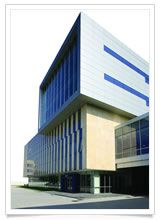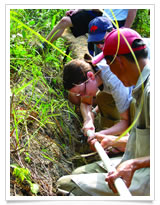by Dr. Paul L. Maier
Everything in China is different today. Remember the old pictures of a street in a Chinese city with 50 bicycles and only one car? Taken at the same spot today, such a photo would still show the 50 bicycles but wedged between 100 cars. Peasant villages have given way to urban sprawl that sprouts towering office buildings gleaming with glass and whole forests of high-rise apartments.
China backward? This past March, when I was invited to lecture for a week at Concordia International School Shanghai (CISS) and landed at Shanghai’s Pudong Airport, I was whisked into the city on a MagLev (Magnetic Levitation) train––the only one in the world. The train rides on a spine of reversed polar electromagnetic plates that eliminate friction and enhance speed. Since it was night, the operators cut the train’s speed to a mere 180 mph through the city. (During the day, they approach 260 mph!) And the Ramada Inn, where I stayed in Shanghai, was not a two-or three-floor motel but a 24-story skyscraper!
And still more surprises lay in store. In 1997, The Lutheran Church—Missouri Synod was invited—by multinational corporations, American expatriates, U.S. foreign-service personnel, and the People’s Republic of China itself—to build an international school in Shanghai. But more: Synod not only accepted the invitation, but today the 10-acre campus of CISS boasts a magnificent series of cutting-edge structures that comprise elementary, middle, and secondary schools with 1,100 students, 140 faculty, four gymnasiums, a handsome concert-assembly hall, a superb student center, and the latest in audio-visual-computer equipment. Oh, and one more near-miracle: it’s all paid for—in less than a dozen years!
How Was This Possible?
Too often, The Lutheran Church—Missouri Synod is regarded as a conservative, traditional church body that catches “the latest wave” only after it has already splashed through other denominations. But this is unfair and largely untrue. The LCMS has been a world leader in religious radio and television, parochial schools, higher education, and international missions. Gifted leaders in our church have recognized great opportunities as they emerged, ever since Martin Luther used the printing press to reform the church. Radio broadcasting had barely been invented when Concordia Seminary chartered KFUO, which remains the oldest continually broadcasting religious radio station in the world.
 |
|
Photo: Karin Semler |
The opportunities in China were no exception. In 1967, the LCMS founded Hong Kong International School, which today has a student body of 2,700. Because of this success—and through diplomatic cooperation with Chinese authorities, American citizens, and U.S. corporations—Lutherans were invited to do the same in Shanghai. It would have been easier and taken much less faith to decline “at this time” in view of unknowns in the future, including the looming Asian economic downturn of the late 1990s, but we were blessed with visionaries like John Schuelke, chief operating officer of the Synod; Richard Peters, a member of our board of directors; and George Horensky, Synod’s comptroller, whopersuaded the LCMS Board of Directors to advance $2 million as seed money to plant CISS.
With support from Hong Kong International School and LCMS World Mission, pioneers in the venture included David Rittmann, Earl Westrick, and David Birner, as well as Frederick Voigtmann of Concordia Consulting in Taiwan. LCMS World Mission called educators, including Dr. Allan and Sandy Schmidt and Michael and Louise Weber, who founded the school in 1998 with only 22 students and 14 faculty and staff. They held forth in a government-built temporary building on a piece of land in Pudong, then a new neighborhood of Shanghai.
How, then, can one explain CISS’s exponential growth? God’s choicest blessings, of course—as well as excellent teachers and a balanced American curriculum with Christian values. China’s new openness to the rest of the world was also crucial. Gone are the xenophobic days of Mao Zedong, due largely to the more enlightened economic policies of Deng Xiaoping. Now, as everyone knows, China sells to the entire globe, with the fastest-growing economy in the world. Businessmen, diplomats, teachers, students, and an army of “expats” (expatriates) from across the globe have arrived in China with their families, and they want their children educated in English—or they’d rather not move to China. To accommodate the growth, the Chinese government has developed a large section of northeastern Shanghai and encouraged the establishment of English-speaking schools there, hence the invitation to the LCMS.
Still, how was it possible for Concordia Shanghai to be in the black less than a dozen years after its founding, even with huge expenditures for its facilities? Simply through academic excellence and charging the going tuition rate for international students—no more, no less—plus the dramatic buying power in China for the American dollar. In the U.S, the cost of one silk tie (made in China, of course) would buy 10 or 15 such ties in China.
The CISS and the LCMS
 |
|
Photo: Karin Semler |
Since 2007, Dr. James Koerschen, former president of Concordia University, Ann Arbor, Mich., has been the “Head of School” (i.e., headmaster) of CISS. As my genial host during the week in which I was privileged to teach at both the elementary and high-school levels, he proved a justifiably proud guide, showing off some of the finest educational facilities I’ve seen anywhere.
Concordia was the first structure in Shanghai to incorporate a ground-source heat-exchange system from a network of more than 112 miles of polyethylene tubing buried deep under the athletic fields, which cuts heating and air-conditioning costs by more than 20 percent. Even CISS’s three garden roofs—one of which is a science observatory—serve a “green” cause through an insulating effect, making CISS one of the most environmentally friendly institutions in China.
A man ablaze with plans for the future, Dr. Koerschen intends to keep CISS in close contact with the LCMS. The outreach of the church through such an institution can hardly be overstated. At Concordia, I saw students from many different nations—not just the English-speaking set—who will become natural leaders in their own countries after finishing their education. The largest groups of non-Anglophone students come from South Korea and more than 20 other countries. One percent of the student body is from the People’s Republic of China itself. While there is no preaching in any of the classes, a deep respect for Christian values and culture cannot but be engendered in these future leaders.
The True Measure of a School
 |
|
Photo: Karin Semler |
Finally, it’s not the impressive physical structures of Concordia or even its dedicated faculty and administration that gauge the worth of this institution, but the question of how well its students learn. Here, the report card glitters. The SATs taken by CISS seniors show dramatically higher scores than the norm. The class of 2010 scored an average of 2000, while the AP (Advanced Placement) exams exceed the U.S. national averages in 19 out of 20 categories, most by a big margin.
Accordingly, CISS has set new standards for academic excellence in East Asia, and its lofty reputation is extraordinary for so young a school. Concordia, in fact, has taken the lead in hosting conferences and competitions among the English-speaking schools in eastern China, such as Shanghai’s National History Day event, at which I was the keynote speaker. Credit the vision of its founders, the excellence of its leadership, and, above all, a collegial and youthful faculty with much esprit de corps and a firm desire to push the academic envelope.
China and Christianity
China is indeed a nation on the move. Under Hu Jintao, its present president, it is more open than ever before, and perhaps some of our old stereotypes regarding China might need some modification. To be sure, the People’s Republic remains a fully secular—and secularist—state that does not espouse religion in general or Christianity in particular. And yet, it was my privilege to preach twice in Shanghai the first Sunday in March, in the morning at a newly founded fellowship that worshiped in a rented clubhouse, and, in the afternoon, at a church built for Protestants by no less than the Chinese government.
Hmmm. China is changing. Perhaps our impressions of China also need a bit of change. The success of our international schools in China is a case in point.
—
About the Author: Dr. Paul L. Maier is third vice-president of The Lutheran Church—Missouri Synod and professor of ancient history at Western Michigan University, Kalamazoo.
CISS: Providing Community and Excellence in Education
By Karin Semler
 |
|
Photo: Karin Semler |
If an informal poll of faculty and parents of Concordia International School Shanghai was taken to provide one word that describes the school, the word would be community. As families are transferred to the fastest-growing financial hub in Asia, they find a home-away-from-home and new “family” at Concordia in the new Pudong area of Shanghai.
“When I needed PediaCare in the middle of the night, I texted a group of friends who showed up at my door to help me,” explains Christine Freeman, a five-year Concordia parent who is originally from Chicago. “I always reas-sure new families that there are many Concordia parents who will take them around to find where to buy things and to share advice.”
At Concordia Shanghai, serving others seems to have been woven into the fabric of the school at all levels. Being “blessed to be a blessing” manifests itself on the micro-level in one-to-one relationships and at the macro-level in the school ethos of caring.
In 2002, three Concordia High School students founded a charity, YEP—the Yunnan Education Project—in response to meeting humanitarian needs of people in rural areas of China. YEP is widely embraced throughout the school with fundraising, project support, and service projects that provide funds and manpower for school buildings, school libraries, school materials, English-language instruction, village water systems, and high-school scholarships. “I don’t know of any other school which has a student-funded charity like Concordia,” says Head of School Dr. James Koerschen. “As a charity, YEP isn’t an add-on—it’s part of who we are as a school.”
As a preeminent Christian international school in the People’s Republic of China, Concordia’s curriculum combines rigorous academics and solid Lutheran education that has shaped generations of young people in the LCMS. Roughly two-thirds of the students identify themselves as Christian.
Academic excellence is not uncommon among international schools, and Concordia Shanghai consistently stands out on external assessments. The class of 2010 achieved an Advanced Placement passing rate of 96 percent on the college-level courses. While still a young school, Concordia’s SAT scores are among the top in Asia. The class of 2010 will begin studies at Notre Dame, Stanford, Cornell, Wellesley, and University of Michigan, to name only a few institutions.
Concordia Shanghai was the first laptop school in Shanghai, with grades 7–12 daily utilizing personal Macbooks on the wireless campus. Most recently, Concordia became the first and only Apple Regional Training Center in Shanghai. Schools from around China and elsewhere in Asia come for training and viewing Concordia’s model of integrated technology.
Viewed as a cutting-edge school, Concordia Shanghai is poised to be a blessing and offer assistance on many levels for the start of a new LCMS international school in Hanoi, Vietnam.
“The administration of Concordia Shanghai has provided guidance and leadership in staffing, decision making, budget development, and support,” says Steve Winkelman, Head of School at Concordia International School Hanoi (CISH). “The teachers at Concordia Shanghai have provided expertise in curriculum development, instructional strategies, and support. CISH would not be in a position to open in August 2011 without the support of the Concordia Shanghai board of directors, administration, and teaching staff.”
“Educators have an amazing opportunity to make a difference in the lives of their students in this unique setting,” observes Louise Schini Weber, recently retired elementary school principal and a founding staff member at Concordia Shanghai. “Step out of your comfort zone and become Christ’s heart, hands, and feet as an international educator!”
—
About the Author: Karin Semler is the assistant director of admissions for Concordia International School, Shanghai, China.
>> To Learn More . . .
- Hong Kong International School, founded in 1966, has an enrollment of 2,700 students: www.hkis.edu.hk
- Founded in 1998, Concordia International School Shanghai’s student body is represented by 26 passports: www.ciss.com.cn
- Concordia International School Hanoi will open enrollment in August 2011.
- International schools begin filling vacancies earlier than stateside schools. Interested educators should explore each school’s hiring process, as positions usually begin to be filled in the fall and early winter.
>> Do you know of anyone with an upcoming business-related transfer to Hong Kong, Shanghai, or Hanoi? Be sure to share information about these international schools!
September 2010





